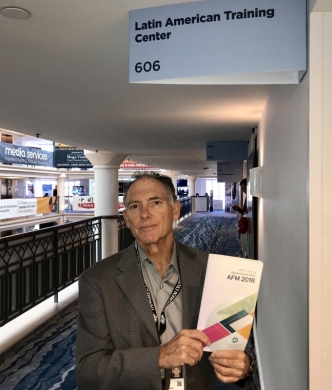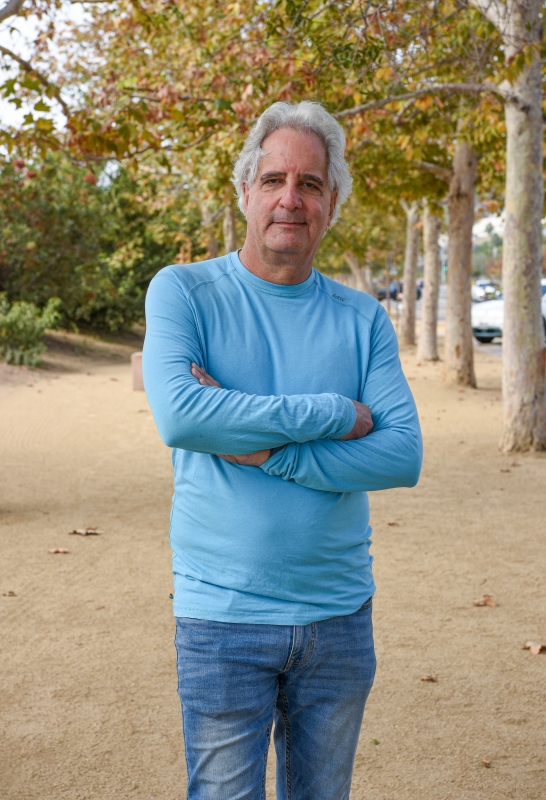|
|
|||||||||||||||||||||||||||||
|
Pro Tools
FILMFESTIVALS | 24/7 world wide coverageWelcome ! Enjoy the best of both worlds: Film & Festival News, exploring the best of the film festivals community. Launched in 1995, relentlessly connecting films to festivals, documenting and promoting festivals worldwide. Sorry for the disruptions we are working on the platform as of today. For collaboration, editorial contributions, or publicity, please send us an email here. User loginActive Members |
American Film Market DailiesFilmfestivals.com will be covering AFM 2023 running November 31 October - 5 November, 2023 Contact us for advertising options Every Fall, the Global Film Industry Converges in Santa Monica: Filmmakers, producers, directors and writers from around the world come to AFM to gain exposure, discover new projects and make deals. The American Film Market & Conferences is the largest motion picture trade fair in the world. 2024: November 5 – 10 Circulation of our newsletter 165 000 subscribers I Facebook AFM Photo Gallery I Twitter I Youtube videos Our AFM Newsletters run each day with a bumper pre roll editions and a wrap edition:
 Interview with Steve Solot, President and CEO of LATC (Latin American Training Center)
American born Steve Solot is President and CEO of LATC (Latin American Training Center) based in Rio de Janeiro, Brazil. Before moving to Latin America, Mr. Solot attained MA degrees in Economics and in Latin American Studies. After almost 25 years spent living in Brazil between Sao Paolo and Rio and working in the audiovisual sphere as Senior VP of MPAA (Latin American division of Motion Picture Association of America), Steve Solot is now founder and President of the Latin American Training Center-LATC, (Centro LatinoAmericano de Treinamento e Assessoria AV) in Rio de Janeiro, which provides a training ground for Brazilian and LATAM (Latin America) film and media producers. Every year, Steve Solot brings a group of LATC producers to LA for a total immersion retreat inside the Hollywood film industry. One day of this immersion program includes a market visit to AFM (American Film Market). 2018 marked the 10th annual LATC trip led by Mr. Solot.
I interviewed Steve during his trip to LA with LATC. Here is what he had to say: How did you get involved working in Brazil and specifically the Brazilian Film Commission Network? Before taking over the Brazilian Film Commission Network-REBRAFIC last year, I ran the Rio Film Commission beginning in 2009, at the request of the Secretaries of Culture of the State and City of Rio de Janeiro at that time. They were aware that I had recently left the Motion Picture Association and believed that my knowledge and contacts in the Latin American and US film industries would be a great asset for the promotion of Rio nationally and internationally. Prior to joining the Rio Film Commission, I founded the Latin American Training Center-LATC, (Centro Latino-Americano de Treinamento e Assessoria Audiovisual) LATC, which operates from Rio as a regional consulting and media training center. It conducts workshops and professional training programs for audiovisual content producers and offers a full range of consulting and representation services. www.latamtrainingcenter.com Previously, I served for over 20 years as Senior VP, Latin American Operations of the Motion Picture Association - MPA, the US film industry trade association of the major US studios including: Buena Vista International (Disney), Sony Pictures International Corp., Paramount Pictures Corp., Twentieth Century Fox International Corp., Universal International Films, Inc., and Warner Bros. International Theatrical Distribution. In that capacity, I was responsible for government relations and operations management of all territories in the region, in all-media sectors, including: theatrical, home entertainment, broadcast television, Pay-TV and protection of intellectual property rights in digital environments.
Can you explain the functions and benefits of working with Film Commission? Film commissions are state or municipal agency for the promotion of audiovisual content and investment. They provides support to producers for production of all formats of audiovisual and promote their jurisdictions as a premier destinations for location shooting, as a means to contribute to economic development and job creation. The Brazilian Film Commission Network (Rede Brasileira de Film Commissions-REBRAFIC) which I manage is the national Film Commission association whose objectives include: ensuring a standardized, high level of support for national and international producers, promoting all regions of Brazil as premier locations for national and international productions, and making available information on film commissions from all regions of the country. The members of REBRAFIC include 11 operational film commissions, as well as 15 film commissions in the process of formation in 14 states and the federal district. www.rebrafic.net
Despite an economic crisis in Brazil and much of Latin America, do you think it is advantageous for foreign productions to film in Brazil and LATAM and why? Historically, economic crises generate opportunities and Brazil and Latin America are no different. In the case of the current recession in Brazil, one of the side effects has been the significant devaluation of the local currency which has made shooting international productions relatively cheaper. In general, Latin America has been slow to develop incentives to attract international production. Brazil is the only major country in the region without an incentive for international producers such as those in place in Colombia (40%), Chile (30%) Mexico (17.5%) Argentina (U$2.6 incentive fund), Panama (15%).
What are the complications foreign producers might face producing a film in LATAM without the help or involvement of a film commission? Producers everywhere need to understand and make use of film commissions. Their services are invaluable and can often save producers time and money. Film commission personnel are professionals who not only are trained to provide support and location shooting information; they can often expedite the issuing of film permits and identify local production services necessary for foreign productions.
Can you explain the complications of the Brazilian and LATAM market in comparison to the US market and why the two are so difficult to bridge together? Brazil is perceived as a “difficult” market by US producers. The US does not have co-production treaties with any other country, and Brazil is no exception. On the other hand, a “financial” co-production with Brazil is feasible but can be quite complex and bureaucratic. Although Brazil does not offer foreign production incentives, it does provide a vast system of incentives and funding mechanisms for local content at the municipal, state and federal level. It is possible to qualify for such incentives via local producers. Film Commissions can open the door to such incentives and also provide recommendations for local producers depending on the profile of the foreign project.
Where do you think, or hope, the Brazilian, LATAM and international markets will be in the future, more in sync with each other or even more locally polarized? The performance of Latin American economies and film industries are notoriously volatile and erratic. Although the general trend has been positive, as local industries have become more “professional” they are still subject to local political changes which affect policy and funding. Local content market shares can be dramatically affected by a single local “blockbuster” which has often been the case in every market, as with “Elite Squad” in Brazil, “Instructions not included” in Mexico and “The Clan” in Argentina. In Brazil, trends over the last 2 years have not been positive for the traditional sectors of the AV industry. After eight years of continued growth in cinema admissions (tickets sold), in 2017 the market was finally impacted by the economic recession and intuitional crises. Admissions in 2017 dropped 1.5%, although box office revenue did increase 4.7% due to the 6.3% increase in average ticket prices to R$14.93. Brazilian film performance was hit especially hard with reductions of 39% in admissions and 34% in box office revenue, while foreign film admissions increased 6% with a 10% increase in B.O. revenue. The national film market share in total admissions fell from 16% in 2016 to only 10% in 2017. So far in 2018, admissions are 140 million, which represent a 9.3% reduction over 2017. The Pay-TV market declined from approximately 20 million subscribers to 18 million, and continued to fall to 17.7 million in September, attributed primarily to “cord-cutting” i.e., cancelling Pay-TV services and moving to video-on-demand streaming services such as Netflix and NET Now. Meanwhile, streaming services continue to expand. Over 30 free or low-cost online platforms offer legal viewing options to Brazilian audiences. At present, the Ministry of Culture and Ancine are leading a heated debate within the national Superior Council of Cinema (CSC) on options for regulation for these services including taxation, possible national content quotas and incentives for international services.
You are here at AFM with a group of film prize winners from around the world. Can you explain the total immersion program you head and what the goal is? The annual LATC Global Film and Television Program is an opportunity to experience an “immersion” into the US audiovisual industry. Through an intensive schedule of meetings, presentations, roundtables and networking with film and television executives, consultants, talent agents, entertainment lawyers, each participant in the LATC Immersion Program has access to commercial, legal, marketing, artistic, academic and new media aspects of the US audiovisual industry in Los Angeles. This year is the 10th edition of the Program and delegations regularly include filmmakers from: Australia, Brazil, China, Singapore, Philippines, Colombia, Dominican Republic, Ecuador, Italy, Japan, Korea, Mexico, Nigeria, New Zealand and Vietnam. During the Program, participants may ask specific questions and discuss their projects with US-based producers, agents, studio executives and distributors, to generate real possibilities for development, financing, distribution and co-production. The delegation also has access to the American Film Market, the premiere global audiovisual marketplace.
You recently published your 4th book on pan-LATAM cinema. Can you explain to us what your vision is with these books? LATC publishes both technical and non-technical books on the Brazilian and Latin American film industries. Last year we launched “Brazilian Cinema Today: Essays by Critics and Experts from Across Brazil” which is a unique collection of articles by leading film critics, spanning Brazil from Rio Grande do Sul to the northern state of Pernambuco, and offering a panorama of current trends and the evolving Brazilian film industry. The compilation is not only a reference tool for the study and debate of Brazilian Cinema, but also serves as a sounding board for some of the country’s most representative film critics on themes of critical importance to their respective cities and regions. This year we published the 3rd edition of “Current Financing Mechanisms for Audiovisual Content in Latin America” which contains articles by a select group of legal and technical experts on the current, principal mechanisms of financing audiovisual content, and corresponding c legislation from 15 Latin-American countries: Argentina, Bolivia, Brazil, Chile, Colombia, Cuba, Ecuador, México, Peru, Puerto Rico, Panama, Bolivia the Dominican Republic, Uruguay and Venezuela. It is a valuable source of information for policy makers, legislators, investors, attorneys, producers, distributors and other professionals in the audiovisual industry to promote the common objective to expand the Latin American audiovisual content industry in a global context. It available free from the LATC site at: Current Financing Mechanisms for Audiovisual Content in Latin America – 3rd Edition
You have contributed so much to international film via your involvement with Brazil and LATAM film, what is next on your slate for future endeavors? Next year we will publish a hands-on guide in English for to “Doing Entertainment Business in Brazil” together with our partner, Cesnik, Salinas & Quintino Law Firm. In addition to traditional and digital media, it will cover games and live performance, and is designed for international investors, licensors, producers, attorneys and others interested in the Brazilian market. Our new LATC Representation Office at the AFM was developed to meet the demand of producers around the world to offer international representation for finished films and projects in development seeking sales, licensing, distribution, coproduction or investment during the entire American Film Market. The Office provides two options for representation, for producers attending AFM and those unable to attend but wish to have their projects in development or finished content available to generate visibility.
Interview by Vanessa McMahon
12.11.2018 | American Film Market Dailies's blog Cat. : Interview with Steve Solot President and CEO of LATC (Latin American Training Center) Interviews PEOPLE
|
LinksThe Bulletin Board > The Bulletin Board Blog Following News Interview with EFM (Berlin) Director
Interview with IFTA Chairman (AFM)
Interview with Cannes Marche du Film Director
Filmfestivals.com dailies live coverage from > Live from India
Useful links for the indies: > Big files transfer
+ SUBSCRIBE to the weekly Newsletter DealsUser imagesAbout American Film Market Dailies Prewitt Jean Prewitt Jean (IFTA) The AFM is not a festival - it is the largest motion picture market in the world. 8,000 industry attendees, including producers, distributors, directors, agents, writers, lawyers & bankers. Over 540 films screened, most world or U.S. premieres.
$US3 Billion spent annually by participants to produce films
8,000+ industry professionals
2,000+ new films and projects
1,000+ production companies
400+ distributors
540+ films screened
100+ world premiers
70+ countries represented
50+ thought leaders speaking
7 days of networking activities
1 beachfront campus that covers it all
Our AFM Newsletters run each day with three bumper pre roll editions and a wrap edition: 2018 FULL HIT STORY TOLD IN 8 EPISODES Pre roll newsletter N° 1 AFM 2017 Wrap & global I N°8 I N°7 I N°6 I N°5 I N°4 I OPENING N°3 I Preview N°2 I N°1 AFM 2016: Pre roll N° 1 I Pre roll N° 2 Opening Newsletter N°3 I N°4 I N°5 I N°6 Focus on ANIMATION I N°7 I Final wrap
View my profile Send me a message My festivalThe EditorUser contributions |
|||||||||||||||||||||||||||






.jpeg)

.jpg)





